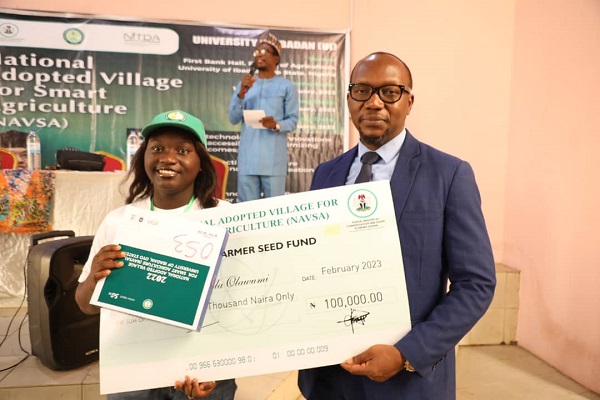
The National Information Technology Development Agency (NITDA) has adopted another set of 75 smart farmers into its National Adopted Village for Smart Agriculture (NAVSA) scheme.
The five-day, intensive training, which was held at the University of Ibadan, Oyo over the weekend, was inspired by the success of the previous sessions and their prospect to attract youths to embrace agriculture, leveraging on digital technologies.
The programme, with the building of a sustainable digital platform that provides varieties of information for more than half of the agricultural sector players in Nigeria to enable a highly-productive agribusiness economy – as one of its goals – has since adopted almost 992 smart farmers and created thousands of direct and indirect jobs for Nigerians.
At the brief closing ceremony and presentation of digital tools and seed funds to the beneficiaries, the NITDA director-general, Mallam Kashifu Abdullahi who was represented by the team lead and assistant director of digital economic development, Dr. Ayodele Bakare, reiterated that the programme is designed to help the farmers raise their efficiency, effectiveness and profitability of their farm businesses through the adoption of digital technologies.
Giving the overview of the programmes, he disclosed that the programme was designed in two folds; to build the digital skill and literacy skills of the beneficiaries and to practically demonstrate to them how feasible it is to run a smart farm.
He said that the programme was initiated by NITDA to demonstrate that IT is an enabler of all other sectors of the economy and, if properly deployed and adopted by farmers, would aid food production and security in the country. He further added that the essence of the training is for the beneficiaries to manage their smart farms and become self-reliant and self-employed.
While advising the beneficiaries to practice what they have learnt from the training, Abdullahi assured them that NITDA would continue to provide the necessary support should the need arise.
Earlier, the vice chancellor of the University of Ibadan, Prof. Kayode Adebowale, who was represented by Prof. Malachy Akporoga of the soil science department, said: “The replica of what NITDA has done for the beneficiaries is to light their candles. They are expected to light the candles of others.
“Most of you would leave this school and go out there to replicate what NITDA has done for you. NITDA cannot train all of you but you have been found worthy of the programme. I believe you [will] also help them train more people. When you start others will follow.”
He pointed out that designing another approach to farming like NITDA’s would translate to food sufficiency, as food is the most important need of man and adopting digital technologies in agriculture has justified this.
Adebowale further enjoined the beneficiaries to “start farming now” because of the situation the world has found itself [in]. “Imagine the price of flour today because Ukraine is at war. I call on you to go out there and become the ‘Ukraine’ of Nigeria”.
In her remarks, the dean of the Faculty of Agriculture, Prof. Stella Odebowale appreciated the Minister of Communications and Digital Economy, Prof. Isa Pantami and the NITDA boss for their foresight to inject digital technologies into farm practices and the propensity of the action to make farming attractive to young people.
“We assure you of the sustainability of this programme and [to] monitor the devices given to our students, to see that they are utilised for the purpose they were given,” she said.
The 75 beneficiaries, drawn from different departments within the faculties of agriculture and computer sciences, were full of praise for NITDA and hailed the programme for broadening their horizon, to see farming beyond a laborious enterprise.
In her remarks, one of the beneficiaries, Deborah Onuchi, expressed delight that farming practices have become seamless and enterprising with various opportunities because of the adoption of digital technologies and its inherent value chain.
She promised that, with the knowledge NITDA has imparted her, she has seen agriculture as a business and not as a means of self-sustenance.
Meanwhile, during the NITDA team’s visit to the vice-chancellor, Prof. Adebowale, he commended NITDA for introducing the new trend in agricultural practices to youths and maintained that young people would adopt these smart technologies if they think them [workable].
“I appreciate the fact that the beneficiaries of this programme are youths who are technologically savvy. Its acceptability is assured, unlike introducing it to older ones who would not accept it because [they are used to] old farming traditions,” he added.


